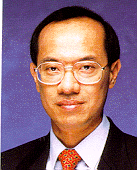 "Dammit. I flunked my Econs S-Paper."
"Dammit. I flunked my Econs S-Paper."A letter to the Straits Times Forum caught my eye today. I saw several angles to it which, I'm fairly sure, the writer himself did not.
June 20, 2005
Embrace elites in order to enrich our society
By Robin Chan
MY APPLICATION to join the 'elite' club was rejected when I failed to score 4 As and a S-paper distinction. My eagerly awaited interview for the prestigious PSC scholarship never materialised. For the first time in my life, I felt vulnerable. The clouds I had been floating on since my days at Raffles Institution suddenly evaporated. I was hurled back into reality and felt like another casualty of 'the system'.
My dreams of overseas study seemingly dashed, it was a while before I summoned up enough confidence to tell myself that I still had the ability to succeed.
I stumbled through NS like an elephant on stilts. It was an awkward and uncomfortable time, but I saw the real struggles of those who had fallen by the wayside. I realised that far from being a casualty, I was still very much a functioning product of 'the system' - I had an education.
I did eventually secure a scholarship that allowed me to go overseas. I was part of the elite again.
There is nothing wrong with an educated or a governing elite. Elitism has become another of those cursed 'isms' - the convenient concoction of complainers.
Elitism is a state of mind, a self-fulfilling prophecy. The more we dislike it, the more it becomes a bane to our society. There will always be casualties, given the meritocratic nature of our system. Which system has no flaws?
Let's turn elitism on its head. We should not let the educated elite be the be-all and end-all of our society. Since we each have a myriad of talents, there is space to create many kinds of elites, and society will be richer for it.
The writer is a second-year student majoring in International Political Economy at Georgetown University in Washington, DC.
The Question of Self-Esteem In my view, one great flaw of the Singapore system is that it disallows Singaporeans from feeling good about themselves. Most people go through it and emerge with their self-esteem damaged. Severely damaged, in some cases.
The misconception is that this is a problem afflciting the Normal stream students, the ITE students etc. WRONG, in my view. The problem exists at all levels.
The letter above is one example. The writer was from Raffles Institution, won an overseas scholarship and is now studying at a prestigious American university. Yet he felt like a "casualty of the system" and suffered a serious confidence problem, when his application for a PSC scholarship was rejected.
This reminds me of one of my friends, a President's Scholar. At that time, he had already graduated with 1st Class Honours from Cambridge and was rapidly rising through the ranks of the civil service. He was feeling somewhat down and wanted to meet me to talk about his woes.
So we met up and I bought him a beer and lent him a sympathetic ear. "So, what's your problem? Let's talk about it," I said. It turned out that he was feeling insecure and inadequate. He felt incompetent and useless. He was having a mini personal crisis of confidence at work.
"You are nuts, my friend," I said, as sympathetically as I could (which is to say, not very sympathetic). "You just got promoted a few months ago. You have a 1st class degree from Cambridge. And you are a President's Scholar. You could sit there and twiddle your thumbs and they will promote you anyway."
"Yes, I know," he said mournfully. "But I feel really lousy. I am not as good as the other President's Scholars.
I am really just not as good as the other President's Scholars."
Local Universities vs Overseas UniversitiesThe letter writer had been deeply disappointed at not being to go overseas for his university education. Has anyone ever thought about how the vice-chancellors and the dons of Singapore's local universities like NUS and NTU would feel about that?
What delicious irony. Our local institutions NUS and NTU have great aspirations to become world-class institutions. At the same time, our brightest young minds have great aspirations to avoid studying at our local institutions NUS and NTU.
While there is much to be said for an overseas education, I can't help but feel that its attraction for so many young Singaporeans is partially due to the marketing strategies of the PSC over the years.
These marketing strategies are hurting NUS and NTU. Perhaps these local institutions must start generating their own counter-hype. Don't ask me, go hire your marketing consultant. Maybe get
Mercermachine. Or even XiaXue, queen of hype.
Slaking the WanderlustAs Acidflask told us, scholarship bonds can be highly disadvantageous to your future career aspirations. So think carefully, young bright Singaporeans.
If your true desire is just to go abroad, see the world and experience life in another country, then I say this -
there
will be other opportunities. Companies these days are forever posting employees to different parts of the world. Many jobs nowadays require the employee to make short business trips very frequently to many different countries. Or to relocate permanently to another country. Or to work on projects for some significant duration (six months to a year) in another country.
And so on.
So don't break your heart over the scholarship you didn't get.
(Personally, Mr Wang Zhen detests travelling on business. Travelling on holiday is fine, but travelling on business is icky)The Dangers of a Overseas PSC ScholarshipMr Wang would like to issue a warning about the dangers of a PSC overseas scholarship. The danger lies in the bond, and the working experience you will gain in those bondage years.
Young Singaporeans may not know enough about the working world to know the risks they are taking. You see, in many, many ways, the government operates very differently from the rest of the world - ie the private sector.
The implications? The experience you gain in the bonded years may not be easily transferable to the private sector, if you should subsequently decide to leave the civil service. Many government jobs have no parallel, or only very rough equivalents, in the private world.
Suppose for example you were a government scholar involved in planning policies to encourage Singaporeans to have more children. Or suppose you were an SAF scholar and your major responsibility was to steer a submarine. Or perhaps you were from the Foreign Affairs Ministry and you specialised in negotiating international treaties with Malaysia.
When it comes to the time to leave the civil service - how relevant do you think your work experience will be, to the private sector?
~~~~~~~~~~
The Grapevine Chatter1.
Zuco's Blog2.
The Depths of Shallowness3.
Heavenly Sword4.
Singapore Angle~~~~~~~~~~














